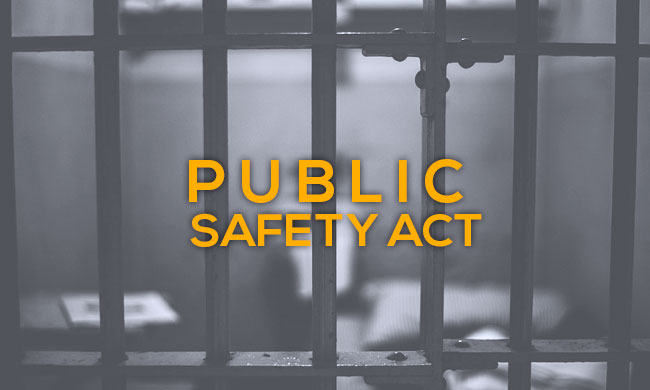Introduction
The Public Safety Act (PSA) is legislation employed in Jammu and Kashmir to combat militancy and insurgency. However, its extensive use of arbitrary detention of civilians has sparked controversy, leading Amnesty International to label it a “Lawless law” due to frequent human rights violations. This article aims to analyze the provisions, controversies, and significant judicial rulings surrounding the act.
Brief Background of the Public Safety Act, 1978
Initially enacted to address timber smuggling in Jammu and Kashmir, the Public Safety Act has been widely utilized to detain individuals suspected of inciting communal disharmony or causing public outrage. As terrorism and insurgency escalated in the region, the act’s application expanded, resulting in concerns over its arbitrary nature and potential for human rights abuses.
Section 8 of the Public Safety Act
Section 8 of the PSA empowers authorities to detain individuals deemed harmful to public order, such as those promoting hatred or inciting violence based on religion, race, caste, community, or region. It also includes individuals involved in preparing or inciting the use of force or committing offences punishable by imprisonment for seven years or more. District Magistrates and Divisional Commissioners possess the authority to authorize detentions under Section 8(2) of the PSA.
Controversies Surrounding the Public Safety Act
Despite aiming to ensure public safety and combat insurgency, the Public Safety Act is widely regarded as a controversial and draconian law. The act grants unlimited powers to administrative authorities to detain any person suspected of posing a threat to the public interest, leading to potential misuse. While Section 13(1) of the act requires authorities to communicate the grounds of detention to the detainee, Section 13(2) permits withholding information if it is deemed against the public interest. This provision undermines the fundamental right of the detainee to represent themselves, consult a lawyer, and apply for bail. Consequently, concerns arise regarding the act’s potential for misuse and its draconian nature. Furthermore, Section 22 of the act provides officials with immunity against any orders passed under its provisions, implying that officials acted in good faith. The act drew national attention when political leaders, including opposition and separatist figures, were detained under its provisions following the revocation of Article 370, leading to criticism of the government’s use of the act to quell unrest in the region.
Constitutional Validity of the Public Safety Act and Article 22
The Public Safety Act has faced controversy, particularly concerning its compatibility with Article 22 of the Indian Constitution. Article 22 ensures that individuals who are detained or arrested are informed of the grounds for their detention, have the right to consult with a lawyer, and must be presented before a magistrate within 24 hours. These provisions safeguard individuals from arbitrary arrests and detentions and serve as a check on executive powers. However, these protections do not apply to the Public Safety Act, as Article 22 subclause (3) specifies that they do not apply “to any person who is arrested or detained under any law providing for preventive detention.” Although the constitutionality of the act’s provisions has been subject to debate, the act is considered constitutional as it falls within the scope of “certain cases” outlined in Article 22.
Duration of Detention under the Public Safety Act
Under Section 18(1) of the Public Safety Act, the maximum period of detention is initially three months, but it can be extended up to twelve months for threats to public order, up to twelve months for timber smuggling, and up to two years for activities prejudicial to the security of the State. The government must refer the case to an Advisory Board within four weeks, and the Advisory Board must deliver its opinion within eight weeks of the detention order being issued.
Revocation of Detention Orders
According to Section 19 of the Public Safety Act, the government has the power to revoke or modify a detention order at any time, even if it contradicts the decision of authorized officers. However, if the revocation is based on technical defects or illegality, Section 19(2) permits authorities to detain the same individual again on the same grounds. This creates a loophole in the act, allowing for repeated detention and harassment of the same person.
Remedies Available to Detainees
Challenging a detention order under the Public Safety Act can be challenging, but individuals can utilize constitutional safeguards to challenge it. This includes filing a writ petition of Habeas Corpus to the Supreme Court under Article 32 or to the High Court under Article 226. However, the scope of the challenge is limited to procedural violations or irregularities. If the High Court determines that there has been a miscarriage of justice and a blatant violation of an individual’s liberty resulting in illegal detention, it can quash the detention order. However, the High Court does not conduct a substantive review of the merits of the detention and generally does not review the “subjective satisfaction” formed by the administration regarding the cause of detention, except in cases where clear discrepancies are evident to the court regarding the detaining authority.
Conclusion
The Public Safety Act is a unique law that grants extensive power to the executive, but it is necessary to strike a balance between individual and national interests. The founding fathers of the country recognized the paramount importance of national interest, and the administration must ensure it for the smooth functioning of the nation. In times of conflict, national interest must prevail, and reasonable restrictions may be imposed on fundamental rights to ensure public safety. While the PSA may appear overbearing, it is necessary for abnormal situations like the current circumstances in Jammu and Kashmir, where militancy has caused chaos and the loss of innocent lives. The PSA grants exclusive powers to the executive to maintain law and order in such situations.





